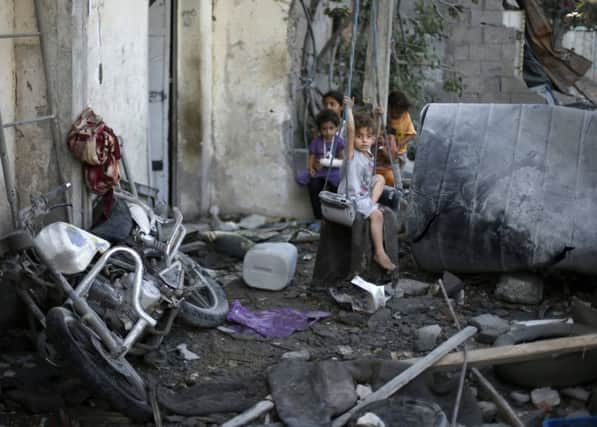Childhood first victim in this war of attrition


CHILDREN never start wars, yet they are the ones paying the price of the world’s inaction in Gaza.
Since violence erupted there three weeks ago, more than 200 Palestinian children have been killed and 2,000 injured.
Advertisement
Hide AdAdvertisement
Hide AdOne in four of the dead is a child and every two hours another dies, while many more are maimed, traumatised, left homeless, terrified and scarred.
One of them is Malak, a two-year-old girl burned from an air strike next to her home east of Gaza City.
Malak’s mother was killed in the attack and her father and brother were both injured.
Lying in her hospital cot as her wounds are treated, the toddler doesn’t realise she will never see her mother again.
She is just one of the estimated 194,000 children who the United Nations say will require specialised psychological support, with many having witnessed family deaths, injuries and displacement.
Every day brings new horrors – bombs falling not just on homes but on hospitals and schools.
This week a playground was hit. Seconds earlier, it had been a scene of children’s laughter and games.
In Gaza now, nowhere is safe.
Some 44 per cent of Gaza’s territory has been declared a “no-go zone” and last week four children playing on a beach and scavenging for metal were killed by a rocket.
Advertisement
Hide AdAdvertisement
Hide AdEvery six-year-old child in Gaza is now living through the third war in their life.
Aside from the risks they face of being injured or killed, we can’t begin to imagine what this means for their long-term mental health and wellbeing.
Children in Gaza can’t leave their homes or places of shelter, while their parents only venture out to buy food and essential supplies. At night, they are terrified and unable to sleep because of air strikes and explosions.
Now, instead of playing in the streets as they normally do when celebrating the end of Ramadan, thousands of children in Gaza are mourning their parents in graveyards, while hundreds are buried with their relatives.
Entire families are being wiped out in seconds by targeted bombs and at least 70,000 children have been forced to flee their homes along with their families.
Many are evacuated to schools, which have become makeshift shelters.
Even here they are not safe as more than 130 schools as well as 22 hospitals and health facilities have been destroyed or damaged, resulting in many more casualties.
Several UN schools operating as such shelters for thousands of families have been hit by rockets, with reports of children being killed while they slept.
Advertisement
Hide AdAdvertisement
Hide AdIn this chaos, many babies are being born far from hospital, some in shelters as the explosions continue outside.
Baby food is running low while maternity support for new mothers and their babies is difficult to provide.
Doctors in Gaza have also reported a doubling in the number of premature births from pregnant women affected by trauma.
On the other side of the conflict, Israeli children have to flee to shelters whenever they come under rocket attack.
The regular sirens spread fear and panic, though at least there are safe places where families and children can find shelter.
Last weekend, during a break in the bombings while a brief ceasefire lasted, Gazan children were able to go outside in the sun for the first time in nine days.
Most tried to find food and clean water for their families. Others looked, some in vain, for their friends.
Those who had been hiding in shelters returned to see what remained of their neighbourhoods, searching the rubble where many bodies still lie.
Advertisement
Hide AdAdvertisement
Hide AdIt’s a dangerous task as thousands of explosive remnants of war are left in civilian areas of Gaza, one more deadly threat to the people who live there.
Water services and healthcare are at breaking point and the destruction of Gaza’s only power station on Tuesday will worsen conditions considerably. Working with our partners on the ground, we have been able to deliver food and other supplies to families in desperate need.
Blankets and mattresses have been handed out to people who have lost their home and everything within it.
First aid kits and supplies for newborn babies and young children are being distributed but every day as more homes are destroyed and the number of casualties increase, the need continues to rise.
From their visits to homes, shelters and hospitals, our team reports that children are at serious risk of becoming traumatised by the horrors they have witnessed and the high level of stress and fear they continue to live under.
We’re providing specialist emotional support to children, to try to help them cope with the terrible situation they find themselves in.
We hope to reach more with vital aid soon, but intensified fighting makes it very challenging to get to the thousands in need.
Children, not combatants, are bearing the brunt of the war and this cannot continue.
Advertisement
Hide AdAdvertisement
Hide AdSave the Children is working in dangerous conditions to reach as many of the affected families as possible.
Ending the violence, as called for by the UN Security Council, is the first and immediate priority.
If the international community does not take action now, the violence against children in Gaza and Israel will haunt our generation.
Save the Children has launched an urgent petition to secure an immediate lasting ceasefire. More information is available at www.Savethechildren.org.uk/Gaza where you can sign the petition, or call 0800 8148 148 to donate to Save the Children’s emergency response.